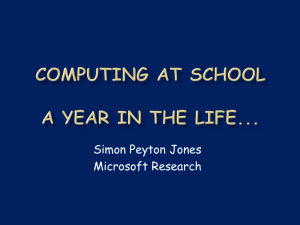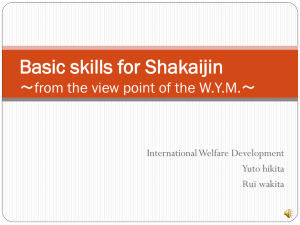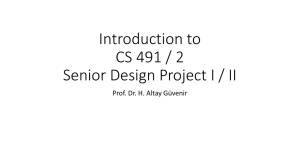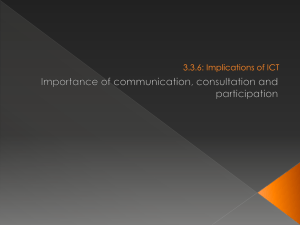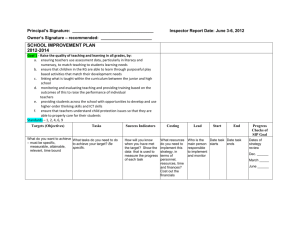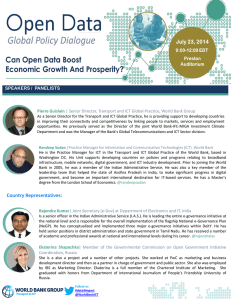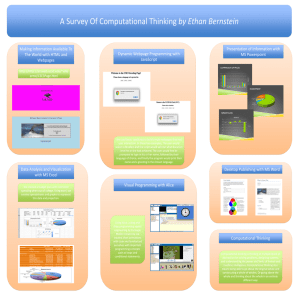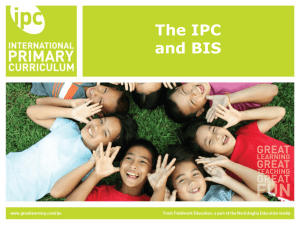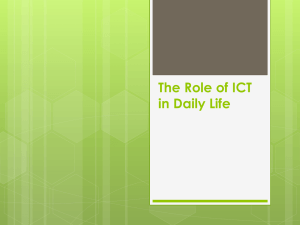Slides - Computing in Dutch secondary education
advertisement
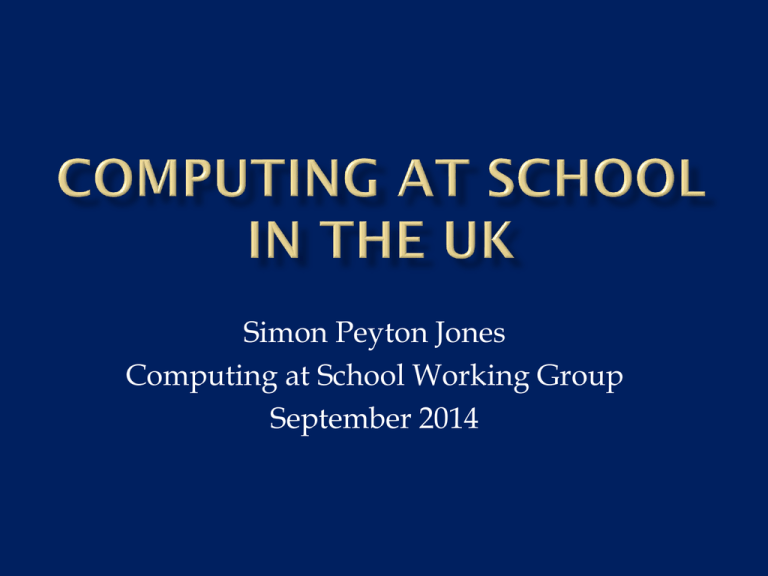
Simon Peyton Jones Computing at School Working Group September 2014 Education should prepare young people for jobs that do not yet exist, using technologies that have not yet been invented, to solve problems of which we are not yet aware Richard Riley At school, we teach both disciplines and technologies & skills Technologies & skills Disciplines • • • • • Principles, ideas Knowledge, laws Techniques, methods Broadly applicable Dates slowly Physics, chemistry, mathematics, English • • • • • • • Artefacts Machines Programs Products Organisations Business processes Dates quickly Budgeting, presentation skills, metalwork, textiles Information and Communication Technology (ICT) Statutory, dominant Computer Science Barely taught • • • • • • Principles Ideas Laws Broadly applicable But needs application Dates slowly No age-16 qualification at all (2009) • • • • • • • Spreadsheets Databases Powerpoint Digital media Using the web Safety on the internet Plan communication projects Range of 14+ different age-16 qualifications ICT Too much Statutory, dominant focus on • Spreadsheets • Databases technology • Powerpoint Computer Science Barely taught • • • • • • Principles Ideas Laws Broadly applicable But needs application Dates slowly • • • • Digital media Using the web Safety on the internet Plan communication projects Not enough on ideas No age-16 qualification at all (2009) Range of 14+ different age-16 qualifications Ideas Create Write Understand Knowledge as well as as well as as well as as well as rather than technology consume read use magic What most people think Computer science is a niche university subject for sociallychallenged males The reality Computer science is a foundational discipline, like maths or physics, that every child should learn, from primary school onwards The study of information computation algorithms, data structures, programs communication and coordination Skills in programing computational thinking abstraction, modelling, design Follow the arrows to generate a sentence (This is a "finite state automaton") and the big pirate dog old a tiny clown huge and BCS Academy of Computing laughed sang danced 10 Computational thinking is the process of recognising aspects of computation in the world that surrounds us, and applying tools and techniques from computing to understand and reason about both natural and artificial systems and processes. Computational thinking is something people do, not something computers do Computational thinking is ubiquitous; it is useful in every profession, and in daily life Primarily rooted in ideas rather than technology hence using the term “computer science” rather than “information technology” Foundational Not just “coding/programming” (although that too) Not just to get a good job (although that too) Not just for geeks, or even future software professionals Ubiquitous, like maths: biology, ecology, design, engineering, astronomy, medicine,… A quintessentially STEM subject (involving Science, Technology, Engineering, and Mathematics) Understand the digital world Understand the natural world Skills for almost any job (just like science) 1. Computer science is educationally foundational 2. Computer science equips students to meet the huge un-met demand from employers. 3. Computer science is tremendous fun: creativity, intellectual beauty, programming, robots, making things do stuff. What more do you want? Simply a group of individuals, concerned about the state of computing education at school in the UK Varied backgrounds, common concerns Teachers Industry (eg Google, Microsoft) University academics (incl CPHC, UKCRC) Members of exam board (eg AQA) Members of professional societies (eg BCS) Parents Local educational advisers Teacher trainers Now fully part of BCS, the Chartered Institute for IT No staff, no money, no office. All volunteers Now over 14,000 members Growing at >5% each month Grass roots organisation Membership Not all teachers! But a lot of teachers Apps for Good Raspberry Pi Hack to the future Young Rewired State Greenfoot cs4fn YouSrc Computing at School CoderDojo Technocamps Code Club Make Things Do Stuff NextGen skills campaign Feb 2011: The Livingstone/Hope report Bring computer science into the National Curriculum as an essential discipline 2011: Ofsted report on ICT Jan 2012: Royal Society Computing in Schools Report The current delivery of Computing education in many UK schools is highly unsatisfactory Computer Science is a rigorous academic discipline and needs to be recognised as such in schools Every child should have the opportunity to learn Computing at school "I was flabbergasted to learn that today computer science isn't even taught as standard in UK schools," he said, "Your IT curriculum focuses on teaching how to use software, but gives no insight into how it's made.“ Eric Schmidt, CEO Google, August 2011 Awarding bodies Number of GCSEs in Computer Science 0 Sept 2009 Sept 2010 OCR 1 Sept 2012 AQA, Edexcel, WJEC CIE 4 Sept 2013 5 GCSE: national examinations taken at age 16 Offered by “awarding bodies” June 2012: Secretary of State Gove withdraws the National Curriculum for ICT (although ICT will remain compulsory). Sept 2012: CAS asked to chair group to write the new national curriculum for ICT (!) Jan 2013: “ICT” re-titled as “Computing”. Jan 2013: Computer Science in the EBacc Sept 2013: final version published Sept 2014: first teaching All pupils can understand and apply the fundamental principles of computer science, including logic, algorithms, data representation, and communication can analyse problems in computational terms, and have repeated practical experience of writing computer programs in order to solve such problems can evaluate and apply information technology, including new or unfamiliar technologies, analytically to solve problems are responsible, competent, confident and creative users of information and communication technology We are, in effect establishing an entirely new school subject The new challenge Encourage, support, and equip the Computing teachers of the nation to deliver the new Computing curriculum with confidence and enthusiasm Not the Dept for Education, which is consciously standing back We will, where "we" = software developers IT professionals university faculty teachers Massive challenge 250,000 primary teachers 20,000 secondary teachers Computing at School (CAS) and the British Computer Society (BCS) have launched a national Network of Excellence for Teaching Computer Science 800+ schools signed up Single goal: support and equip our teachers to teach Computing Modest DfE funding The idea of "K-12 computer science" is rapidly gaining traction around the world Israel: way ahead of us! USA: http://code.org, very high profile Australia: new national curriculum on the way New Zealand: computer science in secondary Belgium, Sweden, Norway, France, Switzerland, Germany, the Netherlands... all have active groups Articulate one simple message: computer science as a discipline, from primary school Empower a broad group of passionate people, not just teachers. Embrace diversity: no “One True Way”. Speak with one voice; avoid the “circular firing squad”; many stakeholders => many, many meetings Civil servants, and even politicians, are usually trying to do the Right Thing Everything happens through personal relationships of trust and respect. How should we teach computer science to 6 year olds, 8 year olds, 10 year olds...? How can we avoid being captured by technology (again)? E.g. turning into an education in coding skills. How should computing be assessed? What does progress look like? How can we share ideas and resources across different educational systems? Engaged, curious, playful Creative Empowered, informed Employed Most political problems are intractable and expensive This one is solvable and cheap This is the moment. We are riding an unstoppable wave of creative enthusiasm Do not wait for someone else to do it. We have to do it. And we can, if we put our minds to it. http://www.computingatschool.org.uk
